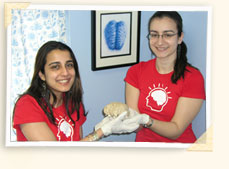|

Student Friends Fight Stigma
Smart, curious, and enthusiastic, McGill graduate
students, Katarina Dedovic and Mehereen Wadiwalla feel privileged
to
be working in the lab of Douglas researcher Jens C. Pruessner,
PhD?a Canadian leader in brain aging research. They're determined
to be part of the Douglas' growing role in fighting the devastating
stigmas surrounding mental illness.
So it wasn't surprising
that they agreed to lead the 2006 Brain Awareness Week
(BAW) campaign, "We thought it
would be amazing to bring the leadership of Brain Awareness
Week back to the Douglas, especially since Douglas students
were the first initiate the BAW campaign in Montréal",
explains Mehereen. "For the past five years, it
was led by other organizations. Because Katarina and
I are
good friends, we knew we'd enjoy coordinating the event
together."
Along with 37 student committee members
and other volunteers, they made the 2006 BAW campaign
a huge success, reaching
8,500 students in 122 elementary and high schools.
Its lecture series also reached an adult audience of
approximately
400,
bringing the latest in mental health research to
the general population. Inspired by Sonia Lupien
Both students originally showed no interest in pursing a
career in neuroscience. As undergraduates, Mehereen wanted
to be a lawyer, and Katarina a doctor. But their plans
changed forever when they enrolled in McGill's Hormones
and Behaviour course, taught by Douglas researcher and
gifted teacher Sonia Lupien, PhD. Mehereen recalls, "It wasn't so much what Sonia Lupien
said. It was how she said it?with so much passion! She was
a force of nature. She made neuroscience come to life. And
she directed me to Jens Pruessner, for which I'll always
be grateful."
Katarina had the same reaction, "She made neuroscience
exciting. I realized that this was what I wanted to do with
my life."
Bus talk
Now that Mehereen is a student at the Douglas and
aware of the depth of its research talent, she wants
to spread
the
word, "Too many people don't know that the best
mental health research in Canada is happening right here."
A recent bus ride showed her how much work still
has to be done, "I was riding the city bus to the Hospital, and
overheard elementary students saying. "Oooooh…the
Douglas! That's where the crazy people live!"
She continues, "When the bus stopped at the Hospital
entrance and I stepped towards the door, a student whispered,
'Is she crazy?' The children stared at me through the windows
as the bus pulled away.
" I want young students like these to understand that mental
illness is nothing to be ashamed of and to think of the
Douglas as an exciting place?where mental health discoveries are
being made." Many youth affected
Katarina is also eager for change, "I emigrated
with my family from Yugoslavia in 1995. Partly due
to the war,
Yugoslavians of all ages, including a lot of young people,
have been suffering from mental health disorders. I see
problems here in Canada too. Many young people aren't
sure what the
future holds and feel depressed and anxious."
Like many of her generation, Katarina knew a student
who committed suicide, "She was just a bit older than
I was. She didn't get the treatment she needed. I thought,
'Okay, it's time to get involved.'" Stigma in academia
"
When it comes to fighting stigma, "adds Katarina, "it's
important to point out that it's not just a problem with
the general public or in the corporate world. It also exists
in academic circles. Some teachers, for example, can be
very standoffish if they hear that colleagues or students
are
taking antidepressants." Don't hide problems…
Both Katarina and Mehereen encourage people with mental
illnesses to ask questions. "Fight the instinct to keep your
problems to yourself," encourages Katarina. "Talk
about them with your doctor or other healthcare professionals.
There's so much that can be done to help."
To those who encounter people with mental disorders,
Mehereen suggests, "Be empathetic. Don't become
impatient and expect affected people to simply 'get on
with life'. Too
often, society views people with mental illnesses as a
burden."
Excited about the future, both students are determined
to make their mark in neuroscience. Mehereen says, "I want
to know that my career will make a difference, that I will
make an impact on the world," and Katarina nods
in agreement.
Don't doubt it. They will. Katarina and Mehereen wish to thank all BAW campaign volunteers,
including Douglas students Irina AlKhairi, Diala Arzouni,
Vincent Corbo, Erin Dickie, Philippe-Olivier Harvey, Aleksandra
Lalovic, Valerie Leduc, Catherine Lord, Kelli McAllister,
Matthew Menear, Lindsay Naef, and Leora Yetnikoff, as well
as the strong support provided by supervisor Jens C. Pruessner,
PhD, and the Hospital, Research Centre, and Foundation staff.
|